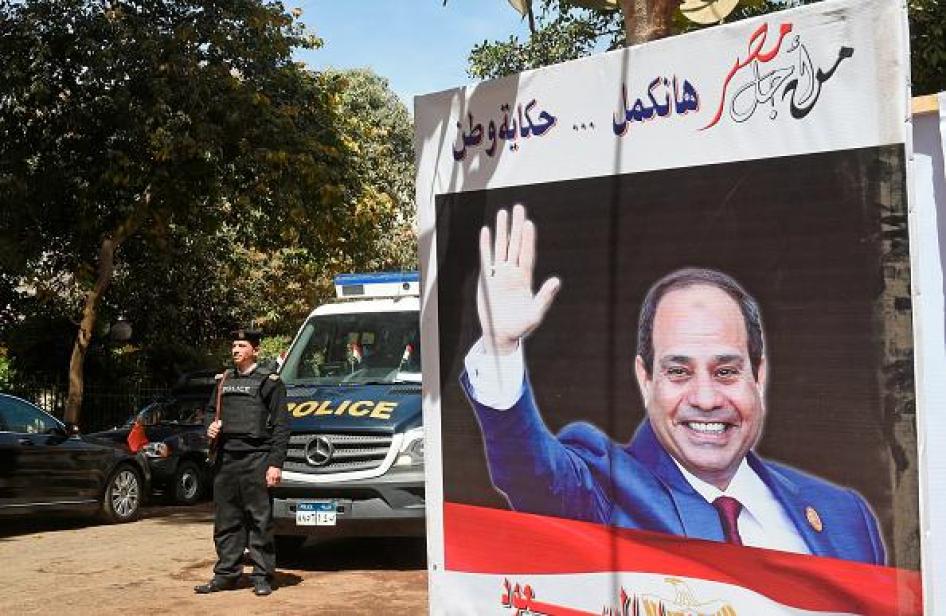(Beirut) – Proposed amendments to Egypt’s constitution, including granting the armed forces authority to intervene in government, would undermine judicial independence and expand executive powers that are already being abused, Human Rights Watch said today.
The amendments, introduced in Egypt’s parliament on February 3, 2019, would make the military “responsible for protecting the constitution and democracy … and the civil state,” effectively granting the army governing authority.
“These amendments reinforce efforts of President al-Sisi’s military-backed government to stifle people’s ability to challenge those in power,” said Michael Page, deputy Middle East and North Africa director at Human Rights Watch. “If the amendments are passed, there is a clear risk that they will formally give the armed forces unchecked authority.”
The current constitution was adopted in 2014, a year after the army forcibly removed Egypt’s first-elected president, Mohamed Morsy.
A parliamentary committee quickly agreed to discuss the proposed amendments, only three days after they were proposed. Egypt’s parliament is dominated by supporters of President Abdel Fattah al-Sisi, with almost no opposition. Since its election in 2015, parliament has acted as a rubber-stamp for government policies and decisions. No minister or government official has been summoned by parliament for questioning in more than three years. Constitutional amendments also require a public referendum, according to the country’s constitution, but none has been scheduled.
Article 140 of the proposed revised constitution would extend presidential terms from four years to six. The draft clause would also add a “transitional article” that would allow the current president, after finishing his term, to run for two more terms. If the amendments are approved, al-Sisi, whose second term will end in 2022, could stay in power until 2034. Since he effectively rose to power in 2013 and later became president in 2014, his government has been overseeing Egypt’s worst human rights crisis in decades, including possible crimes against humanity.
In addition, the amendments could further undermine judicial independence by giving President al-Sisi tighter control over appointing senior judges and largely remove the State Council judges’ authority to revise legislation before it becomes law. The amendments could also grant wider jurisdiction for military courts to try civilians. In the last three years, over 15,000 civilians, including children, have been referred for military prosecution.
The effort to modify Egypt’s constitution follows authorities’ sustained use of counterterrorism policies and state of emergency laws to engage in serious abuses, crush dissent, and to hold elections that are neither free nor fair. During the March 2018 presidential elections, al-Sisi’s security forces arrested potential candidates and intimidated and threatened their supporters.
By stifling other candidates’ campaigns and subjecting them to arbitrary arrests, al-Sisi’s government violated the Egyptian constitution and the government’s international obligations and commitments under the International Covenant on Civil and Political Rights (ICCPR), the African Charter on Human and Peoples’ Rights, and the 2002 African Union Declaration on the Principles Governing Democratic Elections in Africa. Peaceful assembly is effectively prohibited, and dozens of journalists and bloggers have been jailed in recent years for criticizing the government, making Egypt one of the worst jailers of journalists in the world.
After forcibly unseating former President Morsy in 2013, al-Sisi, – then the defense minister – was part of the government that oversaw the planned mass killings of at least 817 protesters in one day when the army and police violently dispersed the largely peaceful sit-in in Cairo’s Rab’a Square. The mass killings were the worst in Egypt’s recent history and most likely amount to crimes against humanity.
Since then, the government has been waging a relentless nationwide crackdown against all forms of dissent. Interior Ministry forces have engaged in torture, enforced disappearances, extrajudicial killings, and the army has carried out home demolitions in North Sinai, resulting in thousands of forced evictions and victims, with little if any attention from Egypt’s allies. Some of these abuses may also amount to crimes against humanity.
Egypt’s allies have remained largely silent in the face of the serious abuses. Despite restrictions on United States security assistance to Egypt mandated by the US Congress, the Trump administration has fully embraced al-Sisi’s government and all but removed human rights concerns from the bilateral relationship. This was reinforced in July, when the administration released funds for Egypt that had previously been held due to human rights concerns. As the US Congress enters its annual budgeting process for the 2020 fiscal year, members of Congress should make clear that there will be consequences on aid allocation to the Egyptian security forces if serious abuses continue.
“Al-Sisi’s government is encouraged by the continued silence of its allies, and if the US, UK, and France want to avoid the destabilizing consequences of entrenching authoritarian rule in Egypt, they should act now,” Page said.








